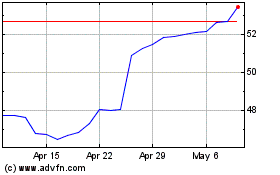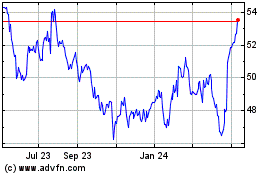Unilever Profit Up 2% in First Half of Year --2nd Update
July 21 2016 - 3:40AM
Dow Jones News
By Saabira Chaudhuri
LONDON-- Unilever PLC Thursday said its profit rose 2% for the
first half of the year, even as revenue slipped on currency
volatility, as the consumer goods giant's focus on controlling
costs paid off.
The maker of Magnum ice cream, Dove soap and Axe deodorant
posted a first-half net profit of EUR2.51 billion ($2.77 billion),
up from the EUR2.49 billion in the corresponding period a year
earlier, while revenue fell 2.6% to EUR26.3 billion as a result of
unfavorable currency movements.
The Anglo-Dutch consumer goods company has been working to
mitigate the impact of a turbulent macroeconomic environment by
raising prices and releasing premium versions of its products. The
company has also adopted so-called "zero-base budgeting" or
justifying each year's expenses from scratch to rein in costs.
Underlying sales--which strip out the impact of acquisitions,
disposals and currency movements--grew 4.7%, which was better than
the 2.9% that Unilever logged for the same period last year.
RBC analyst James Edwardes Jones described the results as
"solid," while Exane BNP Paribas analysts said it was "a good
quarter."
Chief Executive Paul Polman said he sees no sign of improvement
in the global economy, but underscored that Unilever's long-term
focus had helped it withstand a period of "high volatility and
accelerating change."
The results show that Unilever continues to struggle with a soft
environment in both North America and Europe, as well as in its
spreads business, although the company is benefiting from its slant
toward emerging markets.
Sales in emerging markets, where Unilever does the majority of
its business, grew 8% on an underlying basis, up from the 6% growth
the company reported last year.
In North America, Unilever's sales edged up 0.7% on an
underlying basis, while in Europe sales climbed just 0.1%.
The personal care arm--Unilever's largest--saw sales growth of
5.7% on an underlying basis, amid increases in both volume and
price. Volumes in the food business declined but Unilever offset
those by raising prices, translating into underlying sales growth
of 2.3%. Home-care and refreshment--which includes tea and ice
cream--reported underlying sales growth of 6.5% and 4.1%,
respectively.
Unilever's spreads division--which the company houses as a
separate unit with its own budget and management--continued to
struggle, posting a mid-single digit percentage decline in the
first half. Analysts have repeatedly called on Unilever to sell its
spreads business, which despite being highly cash-generative is a
drag on overall sales. "There's no real change in the trajectory,"
said Chief Financial Officer Graeme Pitkethly in a Thursday
interview, commenting on spreads.
Home-care and refreshment--which includes tea and ice
cream--reported underlying sales growth of 6.5% and 4.1%,
respectively. Unilever's tea business has been hit by declines in
oil-price sensitive areas like the Gulf states and Russia, from
which it has historically received much of its revenue. Thursday,
Mr. Pitkethly said the tea business logged low-to-mid-single digit
growth in the first half of the year.
Overall, Unilever has been taking incremental steps to shift its
product portfolio away from slower-growing food sales and toward
higher-margin personal care products and last year reclassified on
the S&P and MSCI indexes from packaged food to personal
products.
On Wednesday, the company said it had agreed to buy subscription
razor company Dollar Shave Club, giving it a foothold in the U.S.
market for razors as well as access to more customer data. That
deal, for a reported $1 billion, is expected to close in the third
quarter.
Mr. Pithkethly said Unilever plans to learn from Dollar Shave
Club's subscription model--through which it sends disposable razors
and other grooming products to its 3.2 million members for a flat
monthly fee--and eventually will use this for other products like
laundry and household care, bespoke prestige products and heavy
items.
"We think this gives us a real step change to build that
capability," he said of the acquisition. "There's a move from big
box to little box that goes through your letter box."
Write to Saabira Chaudhuri at saabira.chaudhuri@wsj.com
(END) Dow Jones Newswires
July 21, 2016 03:25 ET (07:25 GMT)
Copyright (c) 2016 Dow Jones & Company, Inc.
Unilever (NYSE:UL)
Historical Stock Chart
From Mar 2024 to Apr 2024

Unilever (NYSE:UL)
Historical Stock Chart
From Apr 2023 to Apr 2024
